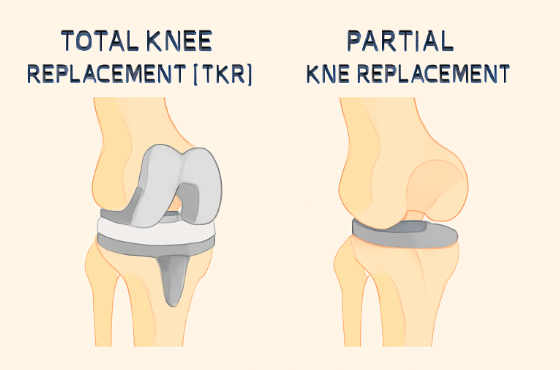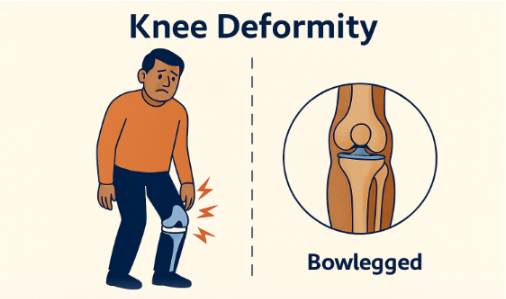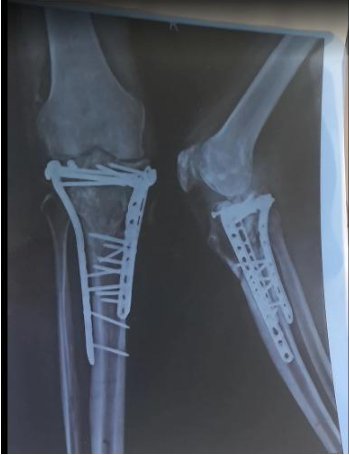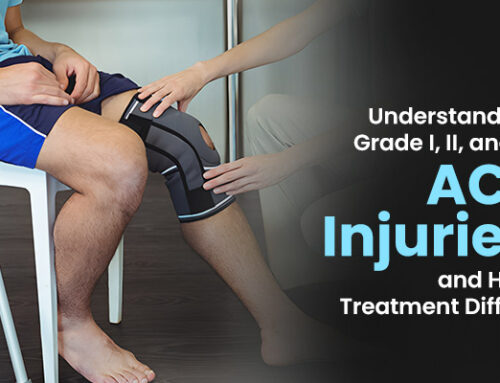Are you struggling with knee pain? Do simple tasks like walking or climbing stairs leave you in discomfort? If so, knee replacement surgery might be the solution.
In this blog, we will help you understand knee replacement surgery. We will cover when it’s the right time for you, the types of procedures, and how it can improve your life.
By the end, you will know whether knee replacement is the right choice for your mobility and quality of life.
Understanding Knee Replacement Surgery
Knee replacement surgery replaces a damaged knee joint with an artificial one. It’s a common and effective treatment for knee pain. This surgery becomes necessary for patients who suffer from various knee problems. Let’s look at what this surgery involves.
Total Knee Replacement (TKR):
This surgery replaces the entire knee joint with a prosthetic. When both the cartilage and bone are damaged, this becomes essential. It reduces pain and improves knee function.
Partial Knee Replacement (PKR)
In this procedure, the surgeon only replaces the damaged part of the knee. It involves fewer cuts and a smaller incision. It works well for people with damage in one part of the knee.

How does the Procedure Improve Mobility and Reduce Pain?
Both total and partial knee replacement surgeries aim to reduce pain. The goal is to restore the knee function. The artificial knee joint helps the bones move. It improves your ability to walk, bend, and move without pain.
Signs You Might Need Knee Replacement
How do you know if knee replacement surgery is right for you? Here are some signs:
Persistent Knee Pain During Daily Activities
Do you feel pain even while walking, standing, or sitting? It may be time to consider knee replacement surgery. Symptoms also include chronic pain that doesn’t improve with rest or medication.
Limited Mobility and Stiffness
Stiffness or limited movement makes it hard to walk or perform other basic tasks. Do you notice that your knee feels locked or doesn’t bend properly? Knee replacement surgery might help restore mobility.
Ineffectiveness of Conservative Treatments
Have you tried physical therapy, medications, or injections, but the pain persists? If conservative treatments don’t work, knee replacement surgery is the permanent solution.
Visible Deformities or Swelling in the Knee

A noticeable deformity, such as bowing of the knee, is a sign of advanced knee damage. Swelling that doesn’t go away also indicates that the knee joint is not in good condition.
Preparing for Knee Replacement Surgery
Preparing for surgery is important to ensure a smooth recovery. Here’s what you can expect:
Pre-Operative Tests and Evaluations
Before surgery, your doctor will assess your health with tests such as X-rays, MRIs, and blood tests. These help determine the condition of your knee and your suitability for surgery.
Lifestyle Adjustments Before Surgery
Your doctor will ask you to lose weight, stop smoking, and make other lifestyle changes. These improvements can reduce surgery risks and speed up recovery.
Discussing Risks and Expectations with Your Orthopedic Surgeon
Before surgery, talk to your surgeon about the risks and what to expect. It’s essential to have realistic expectations and understand the recovery process.
Post-Operative Care and Recovery
After surgery, follow these steps for a smooth recovery:
Pain Management and Wound Care
Expect some pain and swelling after surgery. Your doctor will give you medications to manage the pain. Keep the surgical site clean to prevent infection.
Physiotherapy and Exercise Plan
Physiotherapy is critical after surgery. Your therapist will guide you through exercises to regain strength and flexibility in your knee. This helps speed up recovery.
Timeline for Returning to Daily Activities
Patients can return to normal activities, such as walking and driving, within 6-8 weeks. But, high-impact activities like running may take longer.
Long-Term Care and Joint Maintenance
You will need to maintain your knee joint’s health with regular check-ups and exercise. Proper care will help extend the life of your new knee.
Benefits of Knee Replacement
Knee replacement surgery offers many benefits. It improves both physical health and quality of life.
Pain Relief and Improved Mobility
The most obvious benefit is pain relief. Most patients experience a significant reduction in pain. This makes it easier to move around.
Enhanced Quality of Life
Knee replacement improves the quality of life. It allows you to perform tasks that were once difficult or impossible.
Increased Independence and Activity Levels
Once recovered, you’ll be able to enjoy a higher level of activity and independence. This includes walking, driving, and engaging in physical activities you love.
Risks and Considerations
Knee replacement surgery is safe and effective, but there are some risks to consider. These arise due to negligence in postoperative care. Before any decision, consult the best orthopedic surgeon to avoid any complications.
Surgical Complications
Like any surgery, knee replacement carries risks. These include bleeding, infection, or blood clots. These risks are rare, but you should talk about it with your doctor.
Infection and Blood Clots
Infections and blood clots can occur after surgery. Your doctor will provide steps to prevent these complications, such as antibiotics and blood thinners.
Longevity of the Implant
The artificial knee joint can wear out over time. Most implants last 15-20 years, but younger patients may need a revision surgery in the future.
CASE STUDY
Patient Name: Mr. B.K. ( initials written due to privacy reasons)
Age / Gender: 48 / Male
Health Concern / Symptoms Reported:
Mr B.K. suffered from a major knee injury, leading to significant pain and mobility issues.
Diagnosis:
The patient was diagnosed with a severe knee injury that required surgical intervention.
Treatment Given:
The injury was managed with expert surgical care. The treatment included stabilising and repairing the knee using advanced orthopedic techniques.
Outcome / Result:
Post-surgery, the patient showed substantial improvement, with reduced pain and regained mobility. He is currently on the path to full recovery.
Photos Before/After:

X-ray images attached showing the surgical results. The patient expressed complete satisfaction with the treatment, emphasising the effectiveness of the surgical approach and the quality of care.
The patient’s recovery was successful due to the appropriate surgical intervention, highlighting the effectiveness of modern orthopedic procedures.
Consult an Orthopedic Specialist to Assess Your Knee Health
If you are experiencing knee pain or limited mobility, consider knee replacement surgery. Consult an orthopedic doctor in Jamshedpur, Dr Prashant Arya.
Get back to your life with knee replacement surgery.
FAQs on Knee Replacement Surgery
How long does recovery usually take?
Most patients take 6-8 weeks to recover. Yet, it may take up to a year for full recovery.
Will I need revision surgery in the future?
Most knee replacements last 15-20 years. Younger patients may need a revision in the future if the implant wears out.
Can I continue sports or exercise after surgery?
Yes, most patients can return to low-impact sports and exercise after recovery. Your doctor will tell you when it’s safe to resume activities.







Leave A Comment